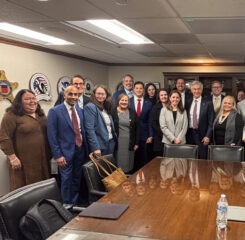The Senate Homeland Security & Government Affairs Permanent Subcommittee on Investigations held a hearing on May 17 on the practice of Medicare Advantage (MA) plans denying care and creating access to care issues. The subcommittee was lead by senators Richard Blumenthal (D-CT) and Ron Johnson (R-WI) and took testimony from five witnesses, including experts from the Office of the Inspector General (OIG) and KFF who have issued reports on the practice of inappropriate care denials by MA plans, a Wisconsin attorney that helps beneficiaries fight MA skilled nursing facilities (SNF) denials, a Marquette visiting research professor and former House Ways & Means staffer, and a widow whose husband sought, but was denied, medically necessary care by his MA plan prior to his death.
LeadingAge also submitted a statement to the subcommittee providing further evidence of the issues the subcommittee is exploring, and the difficulties LeadingAge members experience routinely. LeadingAge and our members have for years been sounding the alarm on these and other issues that threaten Medicare beneficiaries’ access to Medicare services. In March, LeadingAge published a report, Fulfilling the Promise: Medicare Advantage, that explains the issues and offers policy recommendations.
The following themes were heard and reinforced throughout the May 17 hearing and from witness testimony:
1) MA plans are not following the current coverage rules and more oversight is needed;
2) Post-acute care is one of the areas that appears to be denied the most;
3) Third party tools are being used to erroneously deny and limit medically necessary services;
4) MA plans’ gross margins are higher than any other insurance product;
5) Data being collected from plans currently is insufficient to hold them accountable for these denials and make appropriate policy changes to correct these bad practices.
Throughout the hearing, issues were raised regarding plans hiring third party contractors who use algorithms and other artificial intelligence tools to determine what Medicare services an MA plan covers and the duration of those services. As LeadingAge members have observed, it was noted that these tools use generalized data to determine what care is needed but apply it to an individual without ever having seen the patient—the result being care inappropriately denied or cut short. The subcommittee has requested more information from United Healthcare, Aetna, and Humana regarding these tools.
Gloria Bent, the widow of MA enrollee Gary Bent, described the added trauma she felt trying to navigate the complexity and confusion of pursuing appeals to care denials and caring for an ill loved one. Christine Jensen Huberty, an attorney with the Greater Wisconsin Agency on Aging Resources, told subcommittee members that MA plans are routinely denying SNF care for beneficiaries without looking at medical records. These decisions are being made by people who are not their doctors and may not even have knowledge of SNF care. Her team has had to turn away cases because they don’t have the resources to support all of them. In response to a suggestion that prior authorizations are needed because patients might be seeking services they don’t need, Huberty pushed back, saying, “These patients are not abusing the system. They are actively trying to get home and usually return home at the time prescribed by their physician.”
Both Sen. Blumenthal and Sen. Johnson agreed that overall, providers should be making the call about when care is needed. However, the senators diverged on how to approach solving the identified problems. Sen. Johnson indicated he thought problems might be solved with more plan competition versus additional regulation. Sen. Blumenthal indicated that MA plans are in this business to make money and referred to MA as a “bait and switch” by luring beneficiaries in with supplemental benefits like vision and dental but then not providing services when they really need it, as the MA plans are required to do.
He concluded the hearing by saying, “Insurers are, in effect, denying Americans necessary care in order to fatten and pad their bottom lines, and that phenomenon is unacceptable.” He continued, “I want to put these companies on notice. If you deny life-saving coverage to seniors, we are watching, we will expose you, we will demand better, we will pass legislation, if necessary.” The subcommittee will continue to accept statements and additional information on MA care denials, and access to care issues through May.

 Shutdown Week Three: Impact of Ongoing Closure on Affordable Housing
Shutdown Week Three: Impact of Ongoing Closure on Affordable Housing LeadingAge Joins CMS' Oz in Hospice, Home Health Fraud Roundtables
LeadingAge Joins CMS' Oz in Hospice, Home Health Fraud Roundtables


